- Home
- Howard Jacobson
The Dog's Last Walk
The Dog's Last Walk Read online
THE DOG’S LAST WALK
For Aimée
BY THE SAME AUTHOR
Fiction
Coming From Behind
Peeping Tom
Redback
The Very Model of a Man
No More Mister Nice Guy
The Mighty Walzer
Who’s Sorry Now?
The Making of Henry
Kalooki Nights
The Act of Love
The Finkler Question
Zoo Time
Shylock is my Name
Non-fiction
Shakespeare’s Magnanimity (with Wilbur Sanders)
In the Land of Oz
Roots Schmoots: Journeys Among Jews
Seriously Funny: From the Ridiculous to the Sublime
Whatever It Is, I Don’t Like It
CONTENTS
Introduction
The dog’s last walk
So long as there are women laughing, civilisation’s safe
Experience is lovelier than innocence
How to live forever
God is me
Sweet boy, that Jihadi John
All sportsmen die in hotels
Did you see what my arm just did?
Darts: the last refuge of the serious
The erotic gravitas of George Galloway
Toast
In God’s name, why?
Fisherman’s friend
Ignorance is Bravo Lima India Sierra Sierra
In the country of the deaf the man with subtitles is king
Phoney racists
‘Get out of my face!’
Raising the age of consent
Arrivederci Raffaele
Rejoice!
Fanatics only ever read one book
Boris and the bikes
Strictly turn-off
Who dunnit? The one who dunnit last time
Smiley face
There was a rabbi of Kiev
A pocket manual of blame
Death is Venice
How not to be a knob
The glorious madness of Wisden
You’re going the wrong way, mate
Let’s introduce ourselves: what’s your username?
How very dare you
You can’t enjoy Proust or aloo gobi standing up
Nice porn
The shame that outlives us
Calm down, dear
The New Barbarism
Shoot the highwayman
But what if I don’t want to connect to you?
Nostril hair and the university
How to be hip
Peace
The sweet seductiveness of loss
Nellie, I am Catherine Earnshaw
The phoenix and the turtle
The wages of indulgence is darts
What’s Hecuba to you?
In Leonard Cohen’s fedora you too can look like L. S. Lowry
The unhappy wanderer
At least the old aren’t young
There’s always another Dark Lady
Bastard
Scrooge
Is that all there is?
Flyting, sledging, and where to stick your asterisks
Wasp watching
Steady on, Lawrence
Conformity kills
Happy now?
A self-effacing man
When enough’s enough
The world turned upside down
Down and out in Covent Garden
The star is fallen
Advice to a young artist: Don’t be yourself
Cropper
Tenho saudades tuas
Preacher man
American buffalo
Norovirus
Nani in space
The Queen versus Edward Snowden
Into the digital darkness
Nights in white satin; nuns in red nighties
Killing is a serious business
In praise of insincerity
The ghost speech
Yes but no but
And no I said no I won’t No: Molly Bloom decides against casting a vote in the 2015 elections
Culpability Brown
Don’t ask me
Dumb also degrades
The dying bug
Weeping in the new year
Is that a bomb you’re carrying or are you just pleased to see me?
Damnation for dummies
Remembering Odin Testostenhammur
Clowns
It isn’t a day of rest we need, it’s a day unlike the day before
These things of darkness
Offence is sacred
And it’s goodnight from him
A Note on the Author
Introduction
This is my second selection of columns from the Independent and, given that the paper closed in March 2016, it is likely to be my last. The first selection, Whatever It Is, I Don’t Like It, was confined to pieces printed prior to 2010; most of those in this volume are more recent.
The shutting down of any serious newspaper is a small catastrophe; the closure of the Independent, which excited so many hopes for a different spirit in journalism when it first appeared in 1986, is particularly calamitous, not just because I wrote for it for eighteen years, but because its ambitions to be impartial and non-assertive made it peculiarly suited to the sort of writing continental Europeans designate as feuilletonistic – that is to say at once popular and literary, serious without solemnity, perhaps intimate in tone, sometimes taking the form of fiction, eschewing dogma, at all times assuming a shared disinterestedness in matters intellectual and stylistic, and therefore a patient leisureliness – an absence of any hunger to have their own views confirmed – on the part of readers. The end of the Independent is thus one more proof that we no longer read in the expansive, altruistically curious manner we once did.
So how do we describe the way we read now? This introduction is not the place to go into that. Several of the pieces that follow address the question, sometimes fatalistically, sometimes with resigned good humour, depending on how bad the picture looked to me at the time. My education predisposes me to see the worst. And, for reasons that we don’t need to go into here, jeremiads come naturally to me. Though for a feuilletonist of the sort I became in the course of writing for the Independent – I have to say I hadn’t thought of myself in those terms previously – any prophetic tale of woe must contain an awareness of the prophet’s absurdity. I had many an argument with the several editors who came and went between 1998 and 2016, but none ever questioned my right to hold contradictory positions simultaneously, or to make fun of myself in the very course of making fun of others.
Here is one way in which we no longer read the way we did. Asseveration is today the rage: a passion to pronounce with certainty, to aver or declare if you’re the writer; an impatience with discourse of any other sort if you’re the reader. Irony, whose methodology is often slow and covert, finds little favour in those channels of conversation which the social media have made possible. The writer, literal-mindedly meaning what he says, stands and delivers, whereupon the respondent, literal-mindedly believing him, gives the thumbs up or the thumbs down. If you happen to believe that most judgements worth making occupy a hazy, indeterminate space somewhere between ‘like’ or ‘dislike’, and are in a perpetual state of being formed and reconsidered, you will find there are few symbols on the Internet you can make use of. We still await the creation of an emoji that can suggest reluctant demurral laced with intermittent enthusiasm floating precariously on a sometimes calm, sometimes tumultuous sea of doubt.
We’ve had it, is what I’m inclined to say. Soon, all that literature understands by drama, subtlety and equivocation will be gone, and bald s
tatement will be all we have left. But I also know that mankind has a genius for getting itself out of the worst of scrapes. So take as a valediction and a promise these effusions from a defunct paper which for a short while got the joke even when I wasn’t joking.
Howard Jacobson, 2017
The dog’s last walk
The other day – and have no fear, this isn’t another Crufts story – I watched a dog go for a last walk with his owner. Don’t ask me how I knew it was his last walk. I could tell, that’s all. Finalities are unmistakable. Perhaps I should have looked away, but neither dog nor owner was aware of me. So my silent requiem was not, I thought, obtrusive.
I’d been shopping with my wife in Marylebone, buying what you buy in Marylebone on a Sunday – farmers’ market breads and cheeses, rare-breed potatoes, oak-smoked garlic cloves. The good life. We’d paused on a bench in St Marylebone Gardens, right opposite the Fitzpatrick Mausoleum, an elegantly domed stone memorial to Susanna Fitzpatrick, who’d given up the ghost in 1759, aged only thirty. That teaches you something when you’re sitting there laden with indulgences, though I’m not sure what.
A small child was struck by the mausoleum too. She kept running up to it and knocking on its bolted wooden doors. ‘No one in,’ her mother told her. But the child wasn’t convinced. ‘Knock, knock.’ A quick listen, a quick retreat, and then back again. It was just as she had finally decided that there really was no one at home, or at least no one she fancied meeting, that the dog appeared. A black Labrador as old as Methuselah. ‘Done in’ is the best description I can give of him. A Macbeth dog who had grown aweary of the sun and for whom each day was now too like the day before.
He walked with agonising difficulty, his hind legs arthritic, his back a terrible burden to him. It was as though will alone kept him upright. He was barely able to round the mausoleum, and kept stopping. With each tired step he took, his owner stooped to say something to him and patted his head. Laid her hand upon him would be a better way of putting it. A long, infinitely gentle touch, as though to lend him some of her vital spirit.
Whether she was urging him to get up and walk a little further, or telling him he could just sit down now in the gravel if that was what he wanted, take his final rest there and then, I couldn’t hear. But by some agreement they reached a bench where they could pause: she on the seat, he, folded under himself, at her feet.
She was an elegant woman in her middle years. Soberly coiffed and dressed in a smart grey wide-skirted coat and black boots. Had I been a dog I’d have been proud to have such a woman take me for a walk. ‘This is my mistress, where’s yours?’ But the Labrador was past all erotic vaingloriousness now. He didn’t look at her or make any acknowledgement of her presence. For a moment I even wondered if he were blind.
Children scooted past him, cruelly young, carelessly wheeling close to his paws, but he didn’t flinch. It seemed not to be sightlessness that afflicted him, though. He didn’t have that air of relying on other, sharpened senses. It was more indifference. The presence of children didn’t arouse his curiosity, nor did the wildness of their spirits agitate him. What harm could they do? Lay on, Macduff.
I can’t fully explain why he reminded me of Macbeth. It had to do with his blackness – ‘come, thick night’ – the sense of something once strong ebbing from him, the dignity of his defeatedness. He’d reached that point of knowing himself to be beyond amity with another being.
His owner seemed to understand that perfectly. She didn’t ask for anything from him. She didn’t badger him. She held his lead with an exquisite gentleness, careful to do nothing abrupt, as though the lead were the last thread that bound them. She leaned forward, stroked him, laid her hand upon his head, and whispered to him. What did she say? God knows. But he gave no sense that he was required to respond in any way. I doubt she lied to him. I doubt she told him it was going to be all right. She had a gravity that was the mirror image of his. Between the two of them existed all that was serious in life.
The most sombre beings I have ever known are dogs. I never had one of my own, but I sometimes accompanied my father when he walked his Labrador. That dog, too, lived a long time, and in the end decided he would take his final walk on his own. Somehow he escaped the house, made straight for the lake around which my father had walked him for years, and strode calmly in. Couldn’t face the emotionalism of the goodbyes.
Odysseus’s dog Argos the same. This is the saddest story. Argos has been waiting for his owner to come back from the Trojan War. Twenty years and not a word. Once upon a time he and Odysseus had hunted together. But now his only function is to wait, lying on piles of dung, infested with fleas. And then suddenly Odysseus reappears, disguised in order to surprise Penelope’s suitors. Only Argos recognises him. In his excitement he drops his ears and wags his tail. Odysseus, however, dare not let the dog betray him. ‘Dashing a tear from his eyes’, he ignores Argos and walks on. Whereupon, in Homer’s words, ‘Argos passed into the darkness of death, now that he had fulfilled his destiny of faith and seen his master once more after twenty years.’
‘Destiny of faith’ is not a term that enjoys much currency in our human world. Try saying it to the trivial-minded gasbags and laddish swindlers who govern us, who run down our institutions, fondle small boys, lie about what they know, think destiny is five thousand smackers a day and a motor yacht, and don’t know when it’s time to quit.
I watch the black Labrador attempt to lift his handsome head to smell the air one last time. But he can’t do it. His owner kneels and lays her hand upon him. Then we get up and leave.
So long as there are women laughing, civilisation’s safe
If there is one thing theocracies and their variants have difficulty with, it’s laughter. If there’s another, it’s women. Put the two together and the foundations of their states begin to crumble. When the Turkish deputy prime minister made his speech about ‘moral corruption’ last week, calling for women to be vigilant of their chastity, not to be ‘inviting’ in their demeanour and, above all, not to laugh in public, he was invoking an ancient neurosis.
Yes, I know Turkey calls itself a secular democracy, but it’s a secular democracy with God looking over its shoulder, and it’s with God, of course – or at least the Jewish, Christian and Muslim mutations of God – that this fear of a woman’s laughter originates. Let the state describe itself how it will; if it is nervous of laughter in general, and women’s laughter in particular, it’s a theocracy. That this remains the case when the god happens to be Karl Marx, I don’t need to remind readers of Josef Skvorecky’s The Engineer of Human Souls and Milan Kundera’s The Joke.
In a wonderful flight of speculative fancy in The Book of Laughter and Forgetting, Kundera imagines the angel overhearing the Devil laughing and realising what the godly are missing out on. He tries to make a similar sound but can’t produce it. He doesn’t have the vocal register, but more than that, he doesn’t have the critical intelligence. ‘Whereas the Devil’s laughter pointed up the meaninglessness of things, the angel’s shout rejoiced in how rationally organised, well conceived, beautiful, good and sensible everything on earth was.’
Laughter, by this account, is the vigorous expression of our scepticism, our refusal to believe that everything is harmoniously conceived, or that a benevolent agency – God or Big Brother – shapes our ends. Which explains why the angel, the cleric or the apparatchik cannot laugh: there is nothing in their conception of the world to laugh about. Charles Baudelaire dates laughter to the moment of man’s fall. Had we behaved in the Garden of Eden as we were meant to, had we settled for being gratefully and serenely supine, as the angel wished, there would have been no reason to laugh. ‘Man being there inflicted with no pain, the expression of his face remains unchanged. Neither laughter nor tears are to be seen in the paradise of all delights. They are both children of suffering.’
Worth remembering, while we are in the Garden, that the architect of our fall, and therefore the architect of laughter, was w
oman. Now is it clear why those who would imprison us in unsmiling paradises of delights are so suspicious of woman? Even where she is not the one doing the laughing, she is the instigator of laughter, enquiring, dissatisfied, critical. The age-old insults that women have had to bear – that they are shrews, termagants, viragos, even that they are sexually insatiable – all testify to man’s fear of her power to disparage and discriminate. We don’t offer marital guidance in this column, but is it not a matter of common observation that the partner wanting the quiet life is, more often than not, the man? And that the engine for change in a marriage is the woman?
Now unloose laughter in her, and the angels are in turmoil. ‘Shame on your immodesty!’ they cry, sticking a wig on her, draping her in a floor-length curtain or, to be on the safe side, sealing her in a bin liner. For if laughter denotes a rebellious spirit (we make an exception for that servile laughter that greets comedians on Live at the Apollo), it is also an expression of sexual desire and appreciation. And while a man likes a woman to laugh desirously on his say-so, he doesn’t want her laughing on someone else’s. I am as guilty as other men when it comes to this. As a boy I didn’t like my girlfriends laughing at jokes I hadn’t made, and today I don’t much care for my wife laughing at books I haven’t written. I overstate the case for effect. Of course I don’t mind, really. And being a modern man with no beliefs, I don’t demand that she covers her legs while she’s reading. So long as she promises never to find another writer funny again.
We live, it’s true, in raucous and unseemly times. Only the other evening, as I was crossing Regent Street, I heard the laughter of a thousand women pouring full-throatedly from a single black cab and felt the tiniest stab of disapproval. Let’s be honest: maybe it was also the tiniest stab of envy – for it would have been fun to be in that cab with them – and the tiniest stab of jealousy – for I would have liked to be that laughter’s cause: not the butt of it, you understand, but its occasion. What happened next threw all these motives into still more confusion. The cab stopped at the lights, two of the women succeeded in thrusting their heads out of the same window at the same time, and in unison they shouted: ‘Show us your willy!’

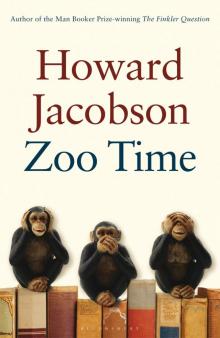 Zoo Time
Zoo Time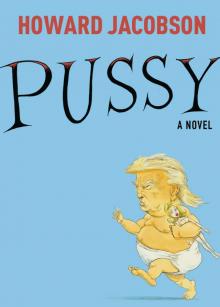 Pussy
Pussy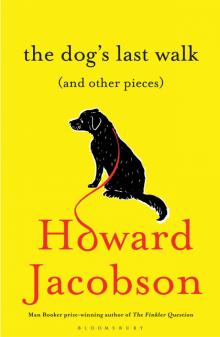 The Dog's Last Walk
The Dog's Last Walk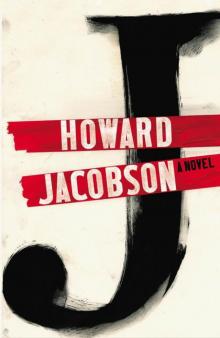 J
J Shylock Is My Name
Shylock Is My Name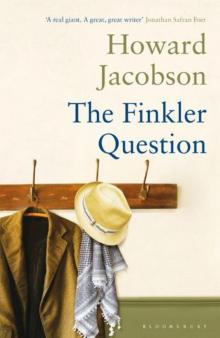 The Finkler Question
The Finkler Question The Mighty Walzer
The Mighty Walzer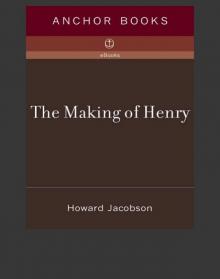 The Making of Henry
The Making of Henry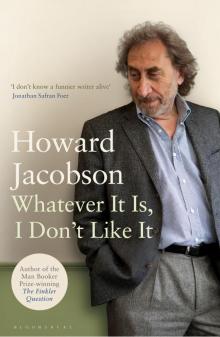 Whatever it is, I Don't Like it
Whatever it is, I Don't Like it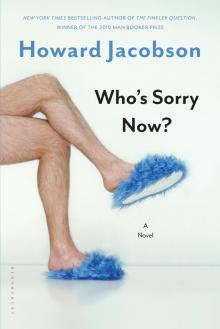 Who's Sorry Now?
Who's Sorry Now? Kalooki Nights
Kalooki Nights